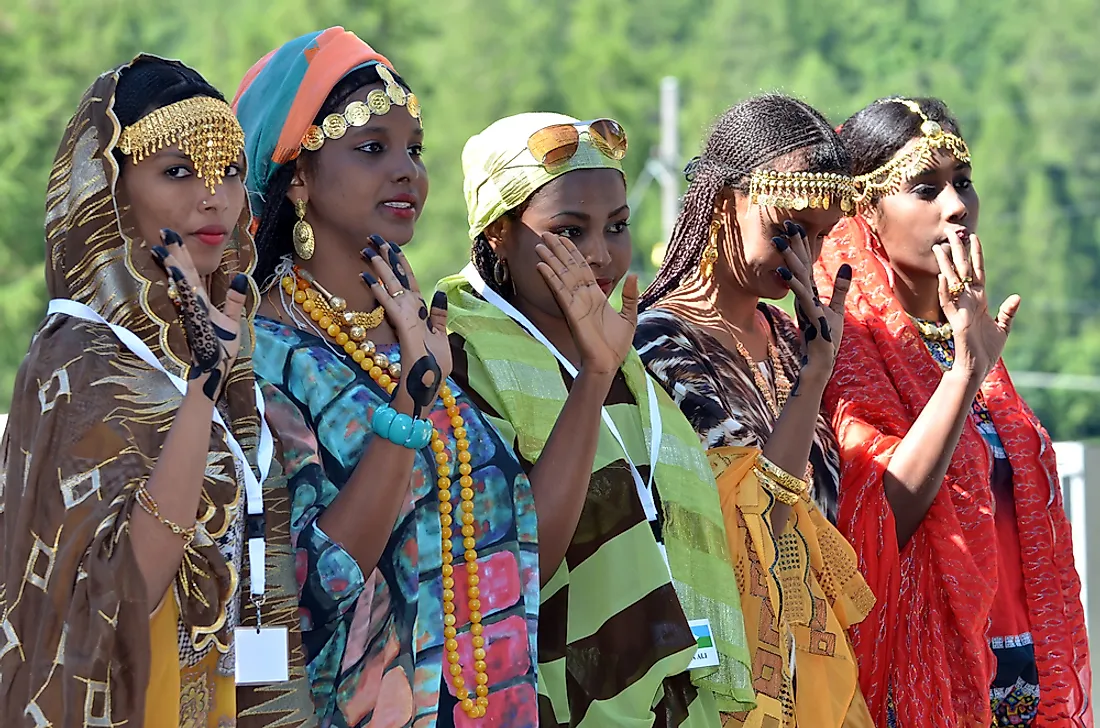The Culture Of Djibouti

Located in the Horn of Africa, Djibouti is a sovereign nation with a population of around 884,017 inhabitants. The Somali and the Afar are the two largest ethnic groups living in the country accounting for about 60% and 35% of the country’s population, respectively. Arabs, French, Ethiopians, and Italians are some of the minority ethnic communities residing in Djibouti. Arabic, French, and Somali are the official languages of the country. Somali and Afar are spoken widely throughout the country as the first languages of the local residents. Arabic is of religious importance while French is the medium of instruction in many academic institutions (a legacy of French colonial rule in Djibouti). The vast majority of the Djiboutians (94%) are Muslims while Christianity is followed by the rest of the population.
Cuisine
The cuisine of the country reflects influences from the Somali, Yemeni, French, Afar, and even Indian cuisines. Spices like cinnamon and saffron are important ingredients used to prepare food. Grain dishes, dairy products, and meat are the staples of the diet. In the cities, the food items are more varied. Grilled fish prepared in tandoor (traditional ovens) is regarded as a delicacy. Spiced mixed vegetable stew or spiced boiled beef soup are also enjoyed. Halva is a popular dessert prepared from cornstarch, sugar, nutmeg and cardamom powder, and ghee. The men often consume the narcotic leaf qat that is imported from Ethiopia.
Literature In Djibouti
Although Djibouti has little creative written literature, the country has a rich oral literary tradition. The pastoral societies of the Somali and Afar communities have well-developed oral poetry tradition that includes poems on war, heroism, adventure, etc. Folktales and legends have also been passed down through generations by word of mouth.
Performance Arts In Djibouti
The different ethnic communities residing in Djibouti each have their distinct styles of music and dances. Some of the common instruments used to play music include the oud (pear-shaped, lute-like string instrument), the tanbura (a string instrument) and drums.
The Afar and the Somali ethnic groups have a rich musical heritage that focusses on folk tales and legends. Somali songs use only five pitches per octave and are called pentatonic.
Folk dances and music performances are often featured on television shows. The government of the country encourages talented performers by sending them to international dance and music festivals and competitions where they showcase their work and the Djiboutian culture on a global platform. Radio stations in the country like (ORTF) Radio air popular Djibouti music. In the urban areas of the country, contemporary pop, rock, and hip-hop music styles are popular among urban youth.
Clothing
Men in Djibouti usually wear Western-style clothing consisting of t-shirts and jeans or trousers. However, men, especially in rural areas, also wear traditional clothing which features a sarong-like garment work around the waist coupled with a loose shirt or top. Those with a nomadic lifestyle wear a loose, white, cotton robe called tobe. The robe extends to about knee-length and the upper end of it is often thrown over the shoulder similar to a Roman toga.
Djiboutian women usually wear a long, light, cotton or polyester dress over a bra and a full-length half-slip. The dresses come in vibrant colors and patterns. Married women adorn a head covering called shash and also cover their upper body with a shawl. On festive occasions, women tend to wear specialized jewelry and bright head-dresses.
Sports
Football is the country’s most popular sport while basketball is also a favorite of the people. The country has its own national football team that is controlled by the Fédération Djiboutienne de Football. The team has participated in several international competitions. The domestic clubs spread throughout the country also participate in inter-club games that serve as a great source of entertainment for the Djiboutians.
Life In Djiboutian Society
In general, the law and culture of the country give men greater rights and a higher status than women. Men enjoy predominance in politics, business, and public life. Women often work in the academic sector, as traders or as civil servants. At home, women are expected to do the household chores and tend to the children. The final say on all financial matters associated with the household usually rests with the male members of the family.
Marriages are mostly arranged, especially in villages. Great attention is paid to the ethnic group, social status, and the family background of a bride or groom while deciding on a marriage.
Domestic units tend to be small in the cities and usually extended in the villages. The pastoralists move in large kin groups consisting of immediate and extended members of the family and the families of allies. The Islamic law prevalent in the country decides the inheritance of property.
Not just the parents, but also the extended family and local community play an important role in shaping the beliefs and behavior of the children. Education is hardly accessible to children in many of rural communities of Djibouti. School dropout rates are also high. Many children also go to the Koranic schools where only religious education is usually given to the children. Therefore, high rates of illiteracy prevail in the country.











